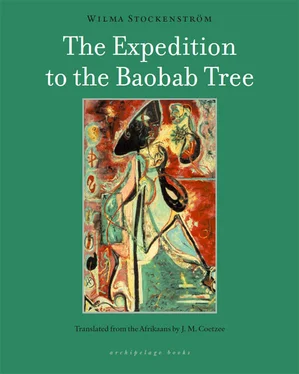Here is something that looks like a woman, said the eldest son. It has breasts. Here is a snake, I think. And look here! An elephant with a scalloped back!
He went into an uncontrollable fit of laughter.
I turned my back on the two of them and stood in the mouth of the cave looking out over the darkening veld at the glimmering evening star. Far away I heard the voices of the slaves, but always against the noise of the wind, which sounded now louder, now softer, like breathing. I felt so depressed. I felt as if my throat were about to constrict, I felt as if the incomprehensible were about to choke me and I had to hurl a cry into the wind which would vanish in the wind.
It is all meaningless, I thought, and walked off and descended the koppie alone. I went as far as a jutting rock, and as I stood there I heard myself say something. Not say. Mumble. Stammer. I heard the words fall from my mouth in snatches over the cliff to be swallowed by the wind filled silence, words that spoke of a jackal that would run through the air with a burning tail and set all the air afire. So there sprang a jackal from my mouth. I heard myself prophesy feverishly of languages that yet slept, of strange trees that would one day march out through valleys and over hills and along the mountainsides. I prophesied that there would be a walking around inside the earth. I prophesied that huge grey breakwaters would be thrown against the sea and that vessels would hide under the water and that there would be migrating back and forth and extermination over and again, and when it was all out of me, when all the fibrous sounds were off my tongue, I felt as if something had been gnawing at me, as if I had been gnawed full of holes and no longer obstructed the wind and had become without resistance; and afraid for myself I climbed down the last stretch as quickly as I could and hastened towards the slaves and the conviviality of the fire.
Once there, I asked them if by chance they had heard me. They stared at me stupidly and went on with their tasks. The one who no longer worked, the so-called leader, did not even look at me, did not deign to reply. Nor had the stranger and the eldest son heard me, it seemed, as I inferred after discreetly inquiring. I felt annoyed and very tired and not relieved.
Now it so happened that the stranger and I slept a short distance from the others near our own flickering fire, while the eldest son slept further away, though near the bearers and a big fire. After the sanga cattle disappeared watches had been set nightly. This practical measure had however lapsed and remained forgotten once we had been bewitched by the water spirit. The laxness of these times had certainly given way to enthusiasm and industry once we were on the near bank, but it was diligence that had required neither urging nor supervision. Even the chains had been left behind on the other bank, and the slaves slept free as we did. To tell the truth, they kept watch in turn over the sleepers on their own initiative, and over the ever-dwindling goods, and took decisions ever more independently. Of course their leader.
Now it so happened that the stranger and I never detected signs of conspiracy between the eldest son and the slaves; and yet one morning when we rubbed the sleep out of our eyes, both he and the whole bunch of slaves together with the goods were no longer there. Vanished. Completely. The stranger climbed a termitary and stared all around without success. The veld was simply veld, with veld-noises — a rustle, a twittering, a chirping.
We tried to track them, we urged each other on and had no success. We noticed flattened grass and footprints in the immediate vicinity of the fires, and that was all. We naturally assumed that if the eldest son and the slaves had decided to proceed with the expedition without us, they would have walked in the direction of the sinking sun, but that way too we detected nothing that looked to us like traces of people on foot. The hard earth showed no tracks and there were grass stalks askew everywhere. We wasted a day wandering about because we secretly hoped that they would come back. That did not happen. When darkness fell a great and horrible realization came upon us. We went to sleep in silence and rose the next morning in silence and set off walking at a reasonable pace. I must add that my sedan chair, the only one of three brought along from the city that was still in use, had been left behind. Without implements we could not chop it up for firewood and the useless object remained beside the ashes of the little fire for which we had gathered together the skeletons of brushwood, all in deathly silence.
We took our direction from the sun, but were forced by the course of rivers to diverge from it. Without slaves to carry us through the water we were helpless. We had no waterbags. We lived on the veld foods that quite by chance I had learned to pick out by keeping an eye on the bearers. It was hard work. I did my best, but we found barely enough to keep body and soul together. In our time of testing in this place of desolation we nevertheless felt of good heart and tender towards each other. But the terrific grandeur of the nights left us dejected.
One day, seeing vultures, we limped along to where they were circling. A revolting stench struck our nostrils. I knew we both had the same thought, but the stench was much too awful. Furthermore the vultures did not give way to us. They hobbled about the rib cage, presumably that of a wildebeest, and pecked each other. They ate greedily as if we, just outside their circle, did not exist at all.
We walked many days. The veld did not change. Sometimes we talked. I expressed my surprise at the eldest son.
They would kill him, take his money, and seek their freedom in the city in the desert — that was the stranger’s opinion.
To this day I do not understand the eldest son’s behavior, this foremost heir of the coastal city’s most prosperous merchant who, because of his father’s influence and power, had been given nothing but the best since childhood, nothing but the finest that civilization could offer, and who had become an eccentric, short-tempered dreamer and fantasizer who had taken out his bad temper on the helpless yet could also dispense alms lavishly. The last time I had seen this happen was on the outskirts of the city on the day of our departure. He took a handful of money out of his leather bag and hurled it from the raised level of his sedan chair at the leprous beggar sitting at the side of the road, without looking at the fellow. Some of the coins struck the man in his tense face. There was nothing for him to do but duck and then creep around after the money on all fours, since his feet were already too blunt to walk; and with hands deformed into dried-out mopani worms, as brown too, as grey and black, he tried to pick up the coins. To maneuver them up.
Rocking from side to side I disappeared around a corner. I think that outcast was the last city dweller on whom my gaze fell. Why don’t the creatures drown themselves? They just keep rotting till they return to the earth. It made me feel sick. More than once we came upon suicides in the woods. We saw pairs of feet, some bare, some still shod in rough sandals, turning around at eye height or hanging motionless, and among the branches glimpsed the contorted faces of old women who looked as if they were hurling abuse at us. Outcasts too. Childless women, or women convicted of witchcraft and shunned because they could not prove they had not let loose the mysterious deaths among the cattle and caused the bad harvests.
Of course I often wonder how long a person keeps on till. Surely there must bea boundary somewhere that becomes clearer and clearer to you, towards which you then reach as towards the greyness of sleep and thence towards the grey dream in which, as in a smaller death, you meet good and evil, the inseparable pair, the twins who defy death.
Читать дальше












